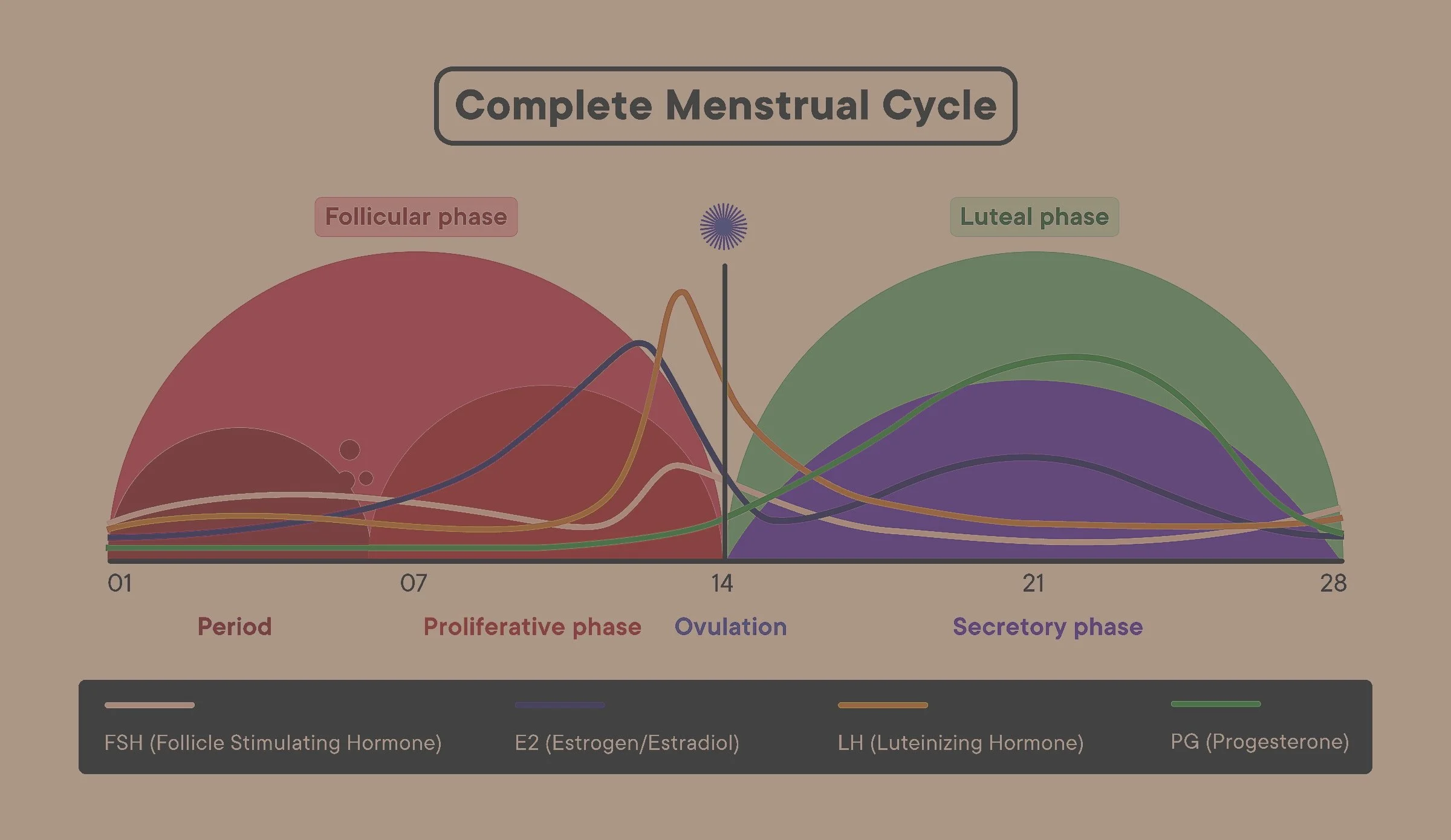
Did You Know...
Your Menstrual Cycle Holds the Key to Understanding Your Mental Health?
The menstrual cycle is more than just a physical experience; it profoundly affects your mental and emotional well-being. From follicular though luteal, the phases of your entire cycle are ever flowing to make a complete circle. The hormonal fluctuations within each phase lend different levels of executive functioning, varying amounts of energy, and completely differing areas of focus. These come together in such different ways, leading to each phase having the ability to either sabotage the next or live cohesively.
Premenstrual syndrome (PMS) and premenstrual dysphoric disorder (PMDD), within luteal phase are some parts of the cycle that have seen some focus, but that leaves a lot misunderstood, and still unknown. That leaves out so much of the cycle! The entire cycle continues to create changes your body undergoes each month can influence your mood, stress levels, and overall mental health but is left unspoken about.
By understanding the connection between your entire cycle and your mental state, you can better manage your emotional health and harness the power of your cycle to live a more balanced and fulfilling life. Explore how your menstrual cycle impacts your mental health and discover effective strategies for navigating these changes with confidence and grace.
HERE are SOME INTERESTING FACTS ABOUT MENTAL HEALTH DURING MENSTRUAtION THAT A LOT OF US DON’T KNOW!
HORMONAL FLACTUTATIONS
The menstrual cycle involves significant hormonal changes, particularly in estrogen and progesterone levels.
These fluctuations can impact mood and emotional well-being, leading to similar fluctuations in mood. These can range from joy, and contentedness, to impatience, irritability, anxiety, desolation and depression.
PREMENSTRUAL DYSPHORIC DISORDER (PMDD)
PMDD is a severe form of PMS that affects approximately 3-8% of menstruating women. It includes more intense emotional and psychological symptoms such as when the feelings are more severe within depression, anxiety, and irritability, that can and do interfere with daily life.
PRE-MENSTRUAL SYNDROME (PMS)
Most mistakenly assume that only the PMS part of the menstrual cycle involves significant hormonal changes, particularly in estrogen and progesterone levels.
These fluctuations throughout the entire cycle can impact mood and emotional well-being, with each one phase fully impacting the next.
IMPACT ON EXISTING MENTAL HEALTH CONDITIONS or PME
The menstruation cycle can exacerbate existing mental health conditions. Women with depression, anxiety disorders, bpd, or bipolar disorder may experience a worsening of their symptoms during their menstrual cycle. In some cases women may even have been unerringly diagnosed with these or other diagnosis as a result of not taking cycle into account.
WE DON’T TALK ABOUT MENTAL MENSTRUAL HEALTH ENOUGH!
Despite its significant impact on our lives, mental menstrual health often remains a taboo topic. Every month, millions of women experience the ebb and flow of hormones that affect not only their bodies but also their minds. Yet, discussions about how the menstrual cycle influences mental health are rarely part of the conversation. It's time to change that.
Understanding the Connection
The menstrual cycle is governed by complex hormonal changes, primarily involving estrogen and progesterone. These hormones play crucial roles in regulating mood, energy levels, and emotional well-being. For many women, the days leading up to their period, known as the luteal phase, can bring about a range of mental health symptoms. These can include irritability, anxiety, mood swings, and even depression.
Premenstrual Syndrome (PMS) and Premenstrual Dysphoric Disorder (PMDD)
Premenstrual Syndrome (PMS) is a common condition that affects up to 75% of menstruating women. While its physical symptoms—such as bloating, headaches, and fatigue—are well-known, its mental health aspects are often overlooked. Women with PMS may experience heightened emotions, difficulty concentrating, and feelings of sadness or tension.
Premenstrual Dysphoric Disorder (PMDD) is a more severe form of PMS that affects about 3-8% of menstruating women. PMDD can lead to extreme mood shifts, severe depression, and intense irritability that disrupt daily life. Recognizing and addressing PMDD is essential for those who suffer from its debilitating effects.
Impact on Existing Mental Health Conditions
For women with pre-existing mental health conditions, the menstrual cycle can exacerbate symptoms. Conditions like depression, anxiety, and bipolar disorder can become more pronounced during certain phases of the cycle. Understanding this connection can help in managing these conditions more effectively.
Strategies for Managing Mental Menstrual Health
Track Your Cycle: Keeping a menstrual diary can help you identify patterns and predict when mental health symptoms are likely to occur.
Healthy Lifestyle: Regular exercise, a balanced diet, and adequate sleep can mitigate some of the emotional fluctuations associated with the menstrual cycle.
Stress Reduction: Techniques such as mindfulness, meditation, and yoga can help manage stress and improve overall mental well-being.
Professional Support: Don’t hesitate to seek help from healthcare professionals who can offer treatments and strategies tailored to your needs.
Breaking the Silence
It's time to bring mental menstrual health into the spotlight. By talking openly about our experiences and educating ourselves and others, we can break down the stigma and support each other in navigating the mental challenges that accompany the menstrual cycle. Your mental health matters every day of the month. Let’s start the conversation and prioritize our well-being.
